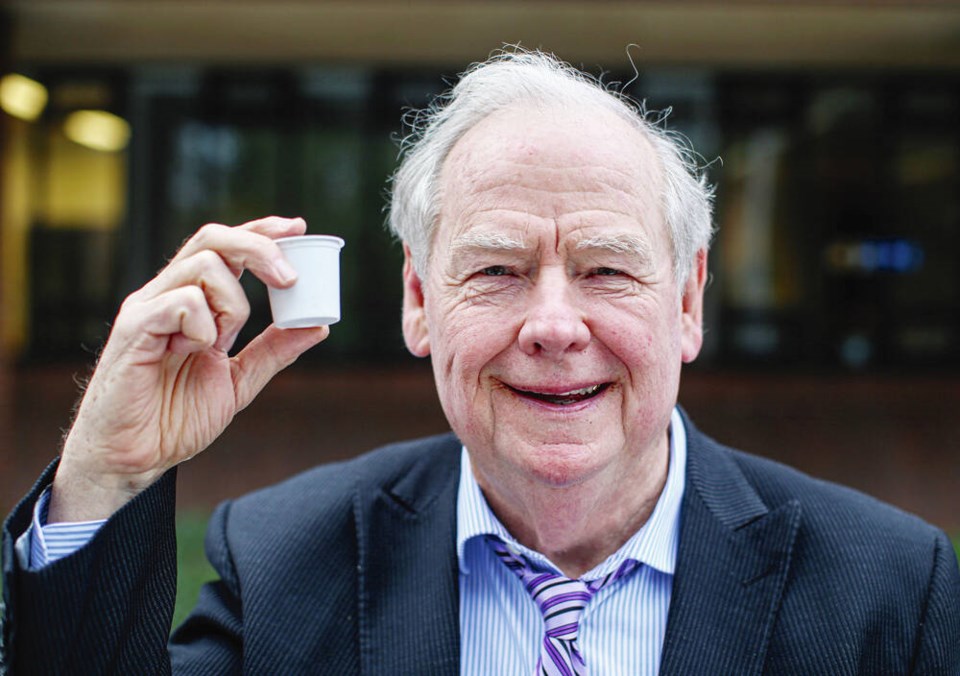When Calvin Sandborn sat down with Margaret Atwood three years ago to write an article urging the federal government to develop a national plastics strategy, he never imagined it would lead to a and a landmark decision about the false advertising of environmental products.
But the day after the article was published, Sandborn, the legal director of the University of Victoria Environmental Law Centre, received a letter from the president of Keurig Canada, stating the company was a leader in sustainable development and that all K-Cup pods in Canada would be recyclable by the end of 2018.
Sandborn was curious when he got the letter. He looked at the company’s ads, which claimed that Keurig’s single-use plastic beverage pods were good for the environment because they could be recycled if consumers peeled off the metallic lid and emptied out the coffee grounds.
“I just had an innate feeling that the cardboard box full of Keurig pods in the faculty room was not part of the environmental solution,” Sandborn said.
He and his team at the Environmental Law Centre investigated and submitted a report to the Competition Bureau in May 2019. Their report said Keurig’s advertising about the recyclability of its coffee pods was not only misleading but was causing substantial harm to recycling efforts across the country.
On Thursday, the Competition Bureau agreed. It announced that Keurig will pay a $3-million penalty for making false and misleading claims that its single-use K-Cup pods can be recycled. The company also voluntarily agreed to make an $800,000 donation to an environmental charity and pay $85,000 in Competition Bureau expenses for the case.
“We feel very fine about this decision of the Competition Bureau,” Sandborn said. “This is great. I think it may open up a whole different set of tools for environmental protection. We’re not going to protect the environmental ultimately if corporations can pull the wool over consumers’ eyes. Consumers can make environmental choices if they have the facts.”
Their investigation found that the pods were not recyclable in most places in Canada. In Calgary, Edmonton, Hamilton, Ottawa, Moncton, Saskatoon, Regina, St. John’s, Toronto and Winnipeg, consumers were advised to put the coffee pods in their garbage.
A report by the Toronto solid waste department said the coffee pods were problematic for its recycling system. Toronto recycling authorities have specifically identified Keurig’s advertising as being harmful — not beneficial — to their recycling programs.
“Basically, the Toronto official said: ‘This is costing us hundreds of thousands of dollars to get these things out of our recycling system, with real damage being done by these ads,’ ” Sandborn recalled.
The pods can be recycled in Quebec and 小蓝视频, but first the metal top has to be removed and the plastic pods washed out. In the Capital Regional District, single-use coffee pods are recyclable in your blue box once the top and coffee grounds have been removed.
“The best way to enjoy coffee is to not use single-serve coffee pods,” says the CRD website. “Brew coffee in a good old fashioned coffee maker instead. Single-use coffee pods have a significant negative environmental impact.”
One of Keurig’s ads showed a man in handcuffs tossing the coffee grounds into the garbage and the pod itself into a blue box.
“If you do that, you contaminate the recycling system,” Sandborn said. “It’s misleading to say you didn’t have to wash it out and pick off the metal cover. You don’t toss the grounds one way and the pods the other. It’s not simple. It’s way more complicated to recycle this thing than to make a bloody cup of coffee the normal way with a reusable filter.”
The law centre’s report showed that the company knew criticism of the environmental impact of the coffee pods threatened its brand. Keurig’s annual report in 2015 warned that if the company failed to meet “sustainability targets, including the successful development and introduction of a recyclable K-Cup pod prior to 2020 100 per cent implementation goal, consumers may lose trust and confidence in our brand and our company’s commitment to sustainability and our brand could be damaged.”
In 2016, it launched its campaign, saying the new K-Cups are conveniently recyclable across Canada.
“That’s why they were fined $3 million,” Sandborn said.
In addition to the financial penalties, Keurig Canada has to change its packaging, publish notices about the changes on its websites, social media and in local and national media outlets, as well as include the information in packaging for new Keurig brewing machines and send an email to subscribers.




